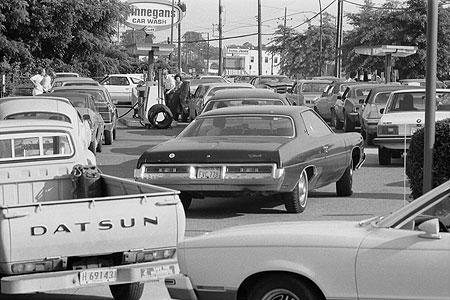
The Arab oil embargo was a six-month reduction in the trade of oil from the Middle East, led by Saudi Arabia against countries that supported Israel in the Arab-Israeli war. This cessation of trade was imposed by Arab Countries on the 17th of October 1973. The embargo was the first oil crisis which led to a significant increase in oil prices and ultimately a worldwide energy crisis. This embargo caused the United States and other Western European countries to reconsider how dependent they were on Arab nations for their oil supply. Along with this, it motivated the West to increase their domestic oil production and take steps towards improving energy efficiency.
The embargo not only resulted in the skyrocketing of oil prices, with costs per barrel increasing to almost five times the normal price, but it also resulted in the dollar’s depreciation, which had a negative impact on the American and global economy, increasing the potential for a global recession. However, American allies within Europe and Japan had stockpiled oil barrels, which they agreed to export to the US, providing a short-term solution to the looming issue of high oil prices. As a result of this, Europe and Japan found themselves in an awkward situation as they required American assistance to secure other energy sources after isolating themselves from the Middle East.
Since the US oil sources were decreasing, they became increasingly dependent on importing oil from other countries and had to negotiate the end of the oil ban. The Nixon Administration’s desperation during negotiations resulted in a shift within the global financial balance of power towards oil, giving the Middle East the reigns regarding oil trading. The embargo resulted in numerous problems, such as high levels of inflation and a reduced scope for growth for oil importers. These issues were caused by multiple varying factors which surpassed the actions that were taken by the Arab members of the Organization of Petroleum Exporting Countries (OPEC). The cooperation between the US and Europe in the oil market began to slip due to a lack of oil production within the American oil fields and the fall of the US Dollar.
In addition to this, when considering the barrels of oil which were unusable due to inevitable leakage and the rise in costs from non-OPEC sources, the reduction in oil supply caused by the embargo approximated to around four million barrels per day, amounting to 7 per cent of the total oil consumption before the embargo. This decrease in availability resulted in soaring prices which resulted in a 2.5 per cent shrink in the US Economy, which, in turn, increased unemployment, inflation and further pushed the country into recession.
However, the impact of the embargo was not solely limited to the countries on which it was imposed. In fact, the consequences were widespread. Increasing imports from countries rich in oil production resulted in a substantial transfer of wealth to them, making them stronger and more capable of challenging the US’s power. Moreover, the reduction in trade also resulted in increased tension amongst the Western Allies and forced them to reconsider their policies regarding oil imports with the Middle East. Japan decided to move away from the oil industry and focus more on electronics and other industries which they could sustain self-sufficiently.
On the other hand, for the Arab OPEC Countries, the success of the embargo was short-lived. The Middle East quickly began to face the negative consequences of the embargo; realising that the new high prices resulted in the Arab nations being forced to form new policies and invest in efficient energy. This included adopting the Fuel Efficiency Standards for Cars (CAFÉ) and increasing research into renewable energy. The disruption in oil supply resulted in the creation of the International Energy Agency (IEA) and the United States Strategic Petroleum Reserve (SPR), both of which took the power of oil control away from the Middle East. While OPEC may not wield the same level of power it once did, it still has large oil reserves and an abundance of resources and still holds importance regarding the trade of oil.
The embargo and oil price surge reshaped the dynamics of global energy and played a pivotal role in determining how the world trades oil today. The Arab Oil Embargo prompted the world to understand the downsides of depending on a certain region for most of the oil production and triggered a wave of introspection amongst countries who were doing so, forcing them to re-evaluate policies, diversify their economies and establish mechanisms which would prevent future oil crises. While the power dynamics in the oil trade have evolved, the lessons learned, and the measures taken in response to the embargo continue to resonate in the ongoing quest for energy security and stability in a globally interconnected world.
Image: Cars wait in long lines during the gas shortage, (Library of Congress Prints and Photographs Division, U.S. News & World Report Magazine Photograph Collection, Warren K. Leffler)



Average Rating